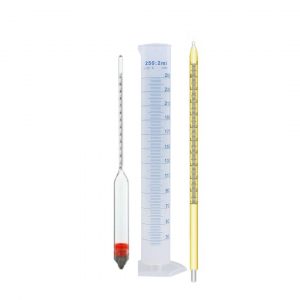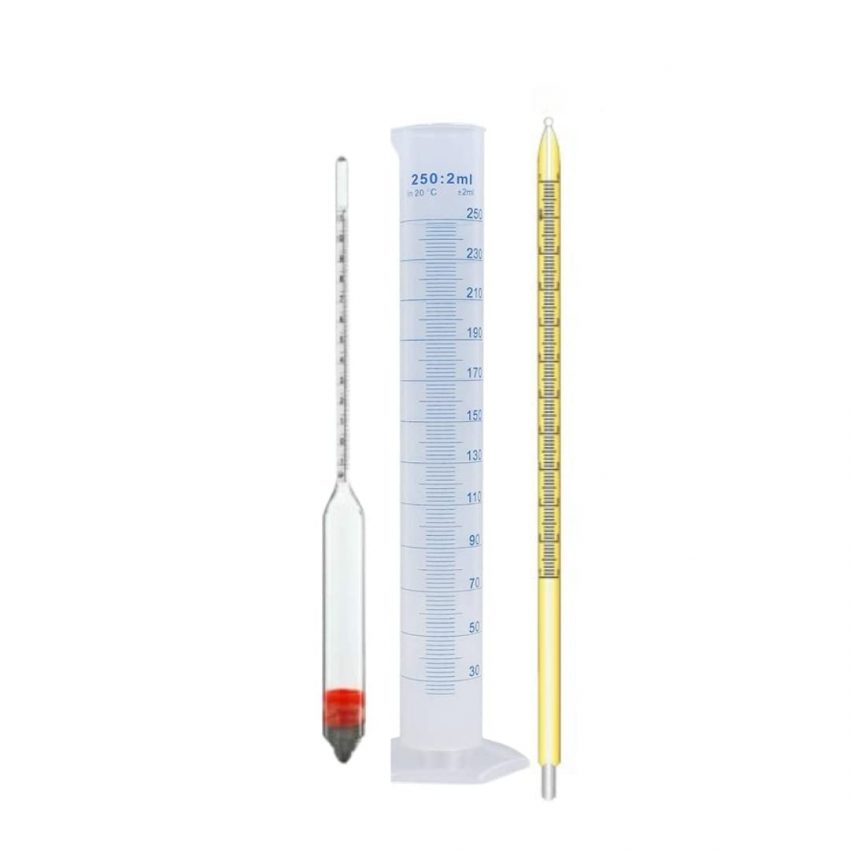Diesel fuel, the lifeblood of countless industries, requires meticulous attention to quality. Just like the engines it powers, maintaining optimal fuel quality is crucial for peak performance, reduced emissions, and extended equipment lifespan. That’s where diesel fuel quality testing comes in.
Diesel also called petrodiesel in Technical Terms, is called High-Speed Diesel (HSD) which is also produced from the fractional distillation of crude oil between 200 °C and 400 °C resulting in a mixture of carbon chains and is composed of saturated hydrocarbons (primarily paraffin including n, iso, and cycloparaffins), and aromatic hydrocarbons (including naphthalenes and alkylbenzenes). Read about HPCL Diesel Here.
How to Use a Hydrometer to Check Diesel Quality
Using a hydrometer can be a helpful initial step in assessing diesel quality, but it’s important to understand its limitations. While it can indicate density and potential adulteration, it doesn’t provide a complete picture of fuel quality. Here’s how to use a hydrometer for diesel:
Materials:
- Hydrometer specifically designed for diesel fuel (not gasoline)
- Hydrometer jar (clean and dry)
- Thermometer
- Diesel sample
- Conversion table (if your hydrometer doesn’t display specific gravity directly)
Steps:
- Gather your materials and ensure the diesel sample is representative. Take the sample from the bulk storage or directly from the equipment, avoiding any sediment at the bottom.
- Prepare the hydrometer: Rinse it with clean water and then with a small amount of the diesel sample, discarding both rinses. This ensures accuracy and avoids contamination.
- Fill the hydrometer jar with the diesel sample: Leave enough space for the hydrometer to float freely without touching the bottom or sides.
- Measure the temperature of the diesel sample: Accuracy is crucial here, as density changes with temperature. Aim for 60°F (15.5°C), but record the actual temperature for later conversion.
- Immerse the hydrometer in the sample: Gently lower it, avoiding swirling or creating bubbles. Let it settle freely for at least 30 seconds.
- Read the hydrometer: Look for the scale marking where the liquid level meets the hydrometer. If your hydrometer displays specific gravity directly, note the value. Otherwise, consult the conversion table based on the recorded temperature to get the specific gravity.
- Interpret the results: Compare the specific gravity to the accepted range for your specific diesel type and application. Consult fuel specifications or a professional for interpretation, as slight variations might be acceptable depending on the context.
Amazon Link Scientifc Diesel Testing Kit (Hydrometer-800-850,+ Mercury Thermometer-0-50*C+ Measuring cylinder-250ML)

Fuel Wings ensures the quality of diesel sourced from HPCL Depots through the following methods:
Stringent Quality Standards: Fuel Wings adheres to strict quality standards set by HPCL to ensure that the diesel meets regulatory requirements and industry standards.
- Regular Inspections: Regular inspections and quality checks are conducted by HPCL officers to verify the quality of diesel before it is procured for delivery by Fuel Wings.
- Trusted Supplier Relationship: Fuel Wings maintains a trusted relationship with HPCL, a reputed supplier known for its commitment to quality and reliability in the fuel industry.
- Quality Assurance Protocols: Fuel Wings implements rigorous quality assurance protocols throughout the supply chain, from procurement at HPCL Depots to delivery to customers, to ensure that only high-quality diesel is supplied.
- Transparent Documentation: Transparent documentation and traceability measures are in place to track the source and quality of diesel from HPCL Depots/ Gantry to reassure customers of its authenticity and quality. Fuel Wings SEALs/ Digital Lock are in practice during transportation. The Customer get SEAL numbers/ Density & Temperature on Delivery Challan.
- Customer Feedback Mechanism: Fuel Wings values customer feedback and promptly addresses any concerns regarding diesel quality, ensuring continuous improvement in service and product quality.
By employing these strategies, Fuel Wings guarantees the delivery of quality diesel sourced from HPCL Depots to its customers, providing peace of mind and reliability in fuel supply.
Why Is Diesel Fuel Quality Testing Important?
Diesel fuel isn’t static. Over time, contamination, degradation, and environmental factors can compromise its quality. This can lead to:
- Reduced engine performance: Lower power output, increased fuel consumption, and sluggish response.
- Increased emissions: Incomplete combustion leading to higher levels of harmful pollutants.
- Accelerated equipment wear and tear: Deposits and corrosion damaging vital components.
- Potential equipment failure: In severe cases, poor fuel quality can cause costly breakdowns.
Regular diesel fuel quality testing helps identify issues early on, allowing for timely action to avoid these detrimental consequences.
What Does Diesel Fuel Quality Testing Cover?
A comprehensive diesel fuel quality testing program typically includes assessments of the following:
- Cetane Number: Measures the ignition quality of the fuel, directly impacting engine performance and emissions.
- Sulfur Content: Regulations mandate low sulfur levels to minimize emissions. Testing ensures compliance and protects sensitive engine components.
- Flash Point: Determines the minimum temperature at which the fuel vapors ignite, crucial for safety during handling and storage.
- Water Content: Excess water promotes microbial growth and corrosion, potentially damaging fuel systems and engines.
- Sediment: Solid contaminants can clog filters and injectors, leading to performance issues and wear.
- Lubricity: Ensures adequate lubrication for critical engine components, reducing friction and wear.
- Biodiesel Blends: If applicable, tests ensure compatibility and adherence to specific blend ratios.
Benefits of Regular Diesel Fuel Quality Testing
The benefits of regular diesel fuel quality testing are numerous:
- Maximize engine performance and efficiency: Optimize fuel utilization and power output.
- Minimize emissions and environmental impact: Ensure compliance with regulations and reduce harmful pollutants.
- Reduce maintenance costs: Proactive measures prevent costly repairs and downtime.
- Extend equipment lifespan: Protect valuable machinery from the damaging effects of poor fuel quality.
- Peace of mind: Operate with confidence knowing your fuel is performing optimally.
How Often Should You Test Diesel Fuel?
The frequency of diesel fuel quality testing depends on several factors:
- Fuel storage duration: More frequent testing is recommended for longer storage periods and seasonal variations.
- Equipment sensitivity: High-performance engines may require more frequent testing.
- Fuel source and quality: Reliable suppliers generally warrant less frequent testing.
Consulting with a fuel quality expert can help determine the optimal testing schedule for your specific needs.
Conclusion
Diesel fuel quality testing is not an optional expense; it’s an investment in ensuring optimal performance, environmental responsibility, and equipment longevity. By proactively monitoring your fuel quality, you can avoid costly consequences and keep your operations running smoothly. So, don’t wait for problems to arise – schedule your diesel fuel quality testing today!

